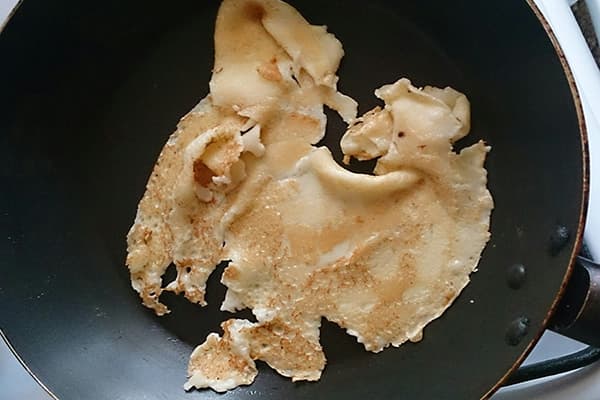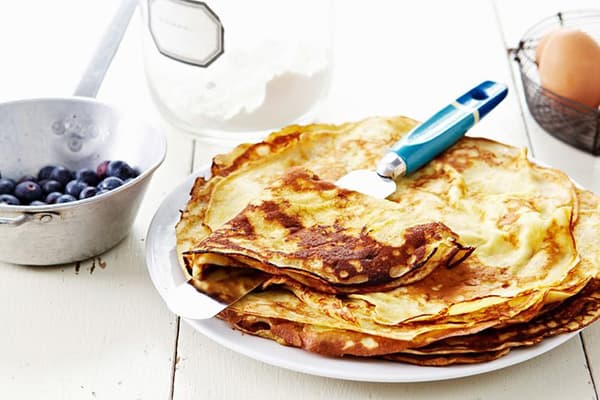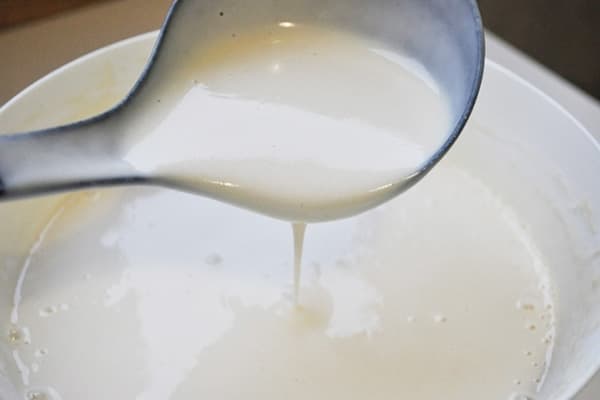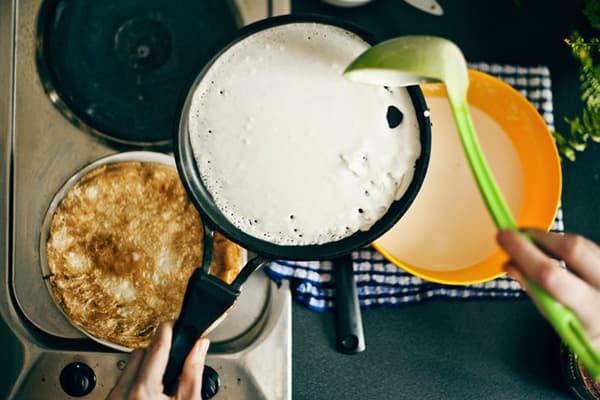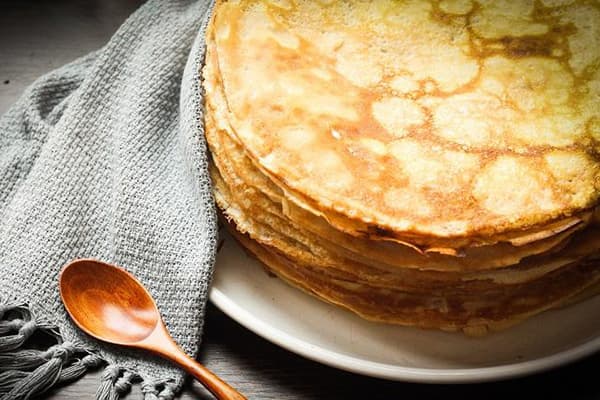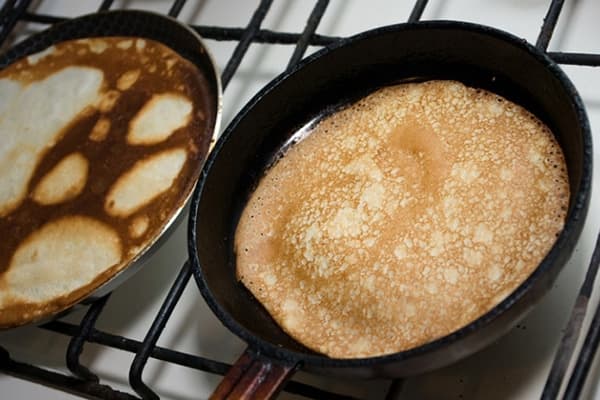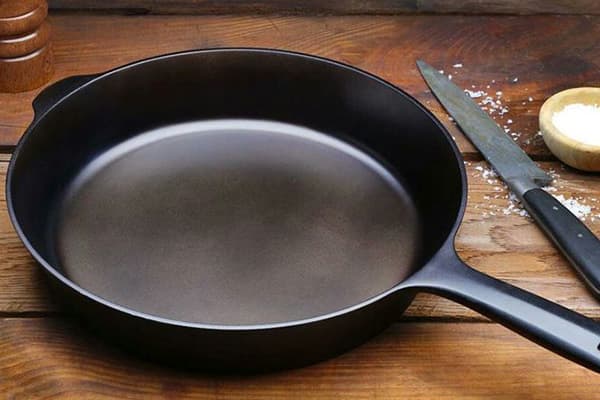Why are pancakes torn and stick to a pan?
Content:
The first pancake is lumpy - not such a rare occurrence. True, often the second and the third often follow the first ... They stick together, tear, stick, burn up ... Both a novice hostess and an experienced hostess may encounter such a nuisance, because there is no single reason for this problem. If the pancakes stick to the pan, it is important to know all the reasons in order to understand exactly how to act in each case.
Why do pancakes stick to the pan?
So, the reason here is far from one. What could it be? In that:
- the dough has an inappropriate consistency;
- pancakes were made according to the recipe with the wrong proportions of ingredients;
- the hostess took a new frying pan;
- the pan is broken;
- the pan has not warmed up properly;
- not enough oil.
Most often, the problem arises when the dough is prepared "by eye", trusting your experience. This is not worth doing, because the consequence of using such a recipe is often the most unpleasant: pancakes are not removed from the pan.
Recipe Issues
What items in the pancake recipe can be violated?
- The amount of flour (it is she who is responsible for the consistency).
- Soda.
- The eggs.
- Sugar.
- Oil.
So flour. Its quantity and quality make the dough more thick or liquid. At the same time, thick, rough pancakes are obtained from too thick, which can burn and stick until baked throughout the entire thickness. If the mass turned out to be liquid, the pancakes come out too thin, so they break when trying to turn them over or remove them.
Why does this sometimes happen, even if the recipe is followed exactly? Because they take flour of a different grade. It has a different percentage of gluten, respectively, with the same amount of liquid, it can give a thicker or more liquid mixture.
How to fix it? In the first case, you need to add the liquid on which the dough was kneaded. It can be milk or water, kefir or mineral water. In the second - add flour and beat the dough with a whisk to break the resulting lumps. Ideally, a mass should be obtained that is approximately between kefir and sour cream in density.
Soda. If there is too much of it, the pancakes become so loose that they simply fall apart when you try to turn them over. If the pancakes “swell”, gathering in folds, then there are definitely a lot of soda. To reduce its concentration, you will have to increase the total volume of the test. That is, to dilute another portion, only do not add soda to it, and mix with the first.
The eggs. Their lack of test affects not only the appearance of pancakes - they look pale and unappetizing. The eggs bind, glue the ingredients together. When the viscosity is sufficient, the dough particles “stick together” during baking, so they lag behind the pan. Otherwise, the pan attracts them with greater force than the one with which they are connected. As a result, they stick to the pan so that it is not always possible to clean them without effort. If the egg added to the mass saved the situation, it means the viscosity was not enough for the test.
Sugar. As you know, sugar begins to caramelize at high temperatures. And the higher its concentration in the dough, the stronger the pancake sticks during frying - it seems to melt into the pan with burning sugar.Therefore, put it in a mass for baking pancakes you need a minimum amount or not put at all, and serve as a complement to them honey, jam or other sweets.
Oil. If this ingredient is not included in the pancake recipe, there is a high risk that they will stick and stick to the pan, since it is oil that creates a natural layer between the dough layer and the metal, eliminating their direct contact.
During cooking, the pan must also be oiled. At least for the first pancake.
Lubricate not only the bottom, but also the side surfaces of the pan, because dough is often poured on them too. Damn may not be removed just because it stuck to the side.
Why do pancakes stick on kefir and milk?
Kefir makes pancakes unusually tender and thin. But that is why it is often difficult to remove them. In order for the baking to go without problems, you need to cook them in a thoroughly washed and wiped dry pan, turn them over with the thinnest spatula and be sure to add vegetable oil to the baking mass.
Pancakes on milk can stick for two reasons: either the milk is too thick, or it was not very fresh and during the cooking process it started to sour right in the dough. In the first option, you need to dilute the milk with water in a ratio of 1: 1 (or add water to the finished dough). In the second - to neutralize the formed acid. To do this, add a little soda and flour to the mass, and also slightly dilute it with boiling water.
Always cook pancakes with the freshest milk to avoid such a nuisance. Then nothing will have to be fixed.
A recipe for pancakes that do not stick to the pan
In order to cook the perfect pancakes, you will need:
- flour of the first or highest grade - 2 cups;
- granulated sugar - 1.5 tbsp. spoons;
- chicken eggs - 3 pcs.;
- sunflower oil - 2 tbsp. spoons;
- medium fat milk - 1 cup;
- sparkling mineral water - 2 glasses;
- salt - 1 teaspoon.
Warm milk is poured into a bowl, mineral water is added. Gradually pour in the sifted flour and stir to break up the lumps. Then add the remaining ingredients and beat with a mixer. Now the dough should "walk" for about 15 minutes. After that, you need to stir it once again with a whisk - and you can bake.
What is the pan to blame?
Not so little depends on the pan. If everything is in order with the dough, and the pancakes stick anyway, then that is the point.
Problems may include the following:
- a new, just bought pan was used;
- the hostess simply changed one pan from household to another;
- used utensils with a damaged coating: scratches, chips, soot, bumps;
- the dough was not poured onto a surface not warmed up to the desired temperature.
When the pancake dough falls on a warm frying pan, it crumbles and sticks together. The surface temperature must be very high. What to do for this? Put the dish on the fire while kneading the dough. Let it warm up properly without oil. And then you can lubricate it and pour pancakes.
How to clean a pan so that pancakes do not stick?
After purchasing, the pan must be rinsed at least to remove any dust and debris that inevitably appears during transportation. You can use liquid detergents for dishes (only in no case abrasive powders!) Or soda solution. And if pancakes are baked on it so that they do not stick, it is better to calcine the purchase with salt for an hour, stirring occasionally (the method is suitable for a pan without a non-stick coating).
If another dish was cooked in a frying pan before pancakes, it could leave its traces - the smallest particles of food, fat, which would burn during cooking and “stick” pancake dough to themselves. Since it became necessary to cook in this pan, it must also be calcined first.
Well, if scratches or other damages appeared on the working surface, any food, not only pancakes, will inevitably pester them. If they are sticky for this reason, you need to take another pan.
Take a separate frying pan for baking pancakes. Then particles of other food will not remain on it.
So, there are many reasons for the pancake dough to stick to the pan. But eliminating them is not so difficult. And you can prevent it by using a good recipe, the right dishes and quality ingredients, by heating the pan before baking. Then pancakes, pancakes and pancakes each time will delight all household members with ruddy sides and wonderful taste.
